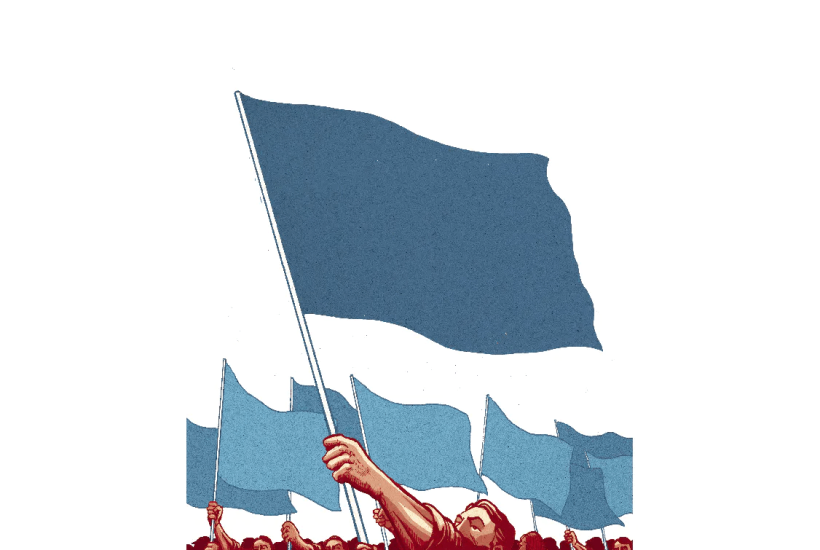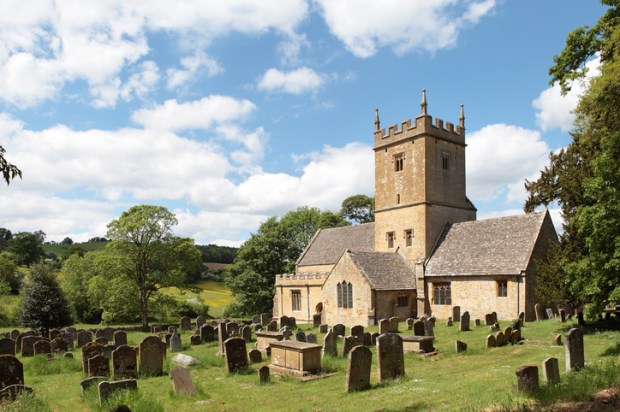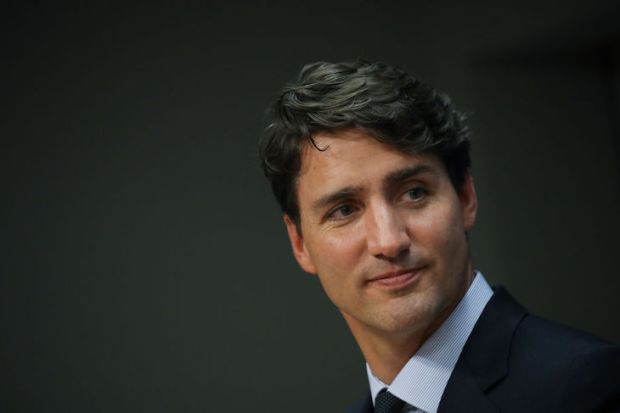‘We – conservatives of left and right, all those who believe in the old way – need to win this battle, to restore the conservative normative as the proper basis for our culture and society, with a restored “covenantal” understanding at the heart of families, neighbourhoods and the nation.’
So the MP Danny Kruger writes in his recently published Covenant, where he also states that ‘To strengthen family life and restore the oikos we need good housing in the right places, jobs that sustain the home, and a decent system of care for children and dependent adults.’
Kruger was recently described in the New Statesman as being ‘at the heart of an influential strain of Tory thinking: post-liberalism’, and indeed one of the problems with defining this wing of the party is with the term ‘post-liberal’. This has been in the ether since Phillip Blond’s Red Tory was cited as an influence on David Cameron (although in reality Red Toryism is almost the exact opposite of Osbornomics). But beyond meaning culturally Right and economically Left, I’m not entirely sure what it means, especially as it seems to have a slightly different definition on either side of the Atlantic.
I’m certainly sympathetic to post-liberalism. I believe that high levels of inequality are a sign of an unhealthy society; government should be aimed at helping the ‘average man’ enjoy a decent living rather than just focusing on aspiration; deindustrialisation had a devastating impact on many British cities and the decline of working-class men’s wages has a particularly negative social influence (the husband:wife income ratio is heavily linked to marriage and divorce rates); the sexual revolution has had a downward effect on happiness and wellbeing, and is at least partly responsible for rising anxiety rates in teens; married parents are on average a huge advantage for children and this should be a social norm; despite what some people claim, prohibition does work in reducing consumption and this should inform policies on gambling, drugs, alcohol and porn.
National identity is a positive force, and a nation-state is the best means of delivering a safe, egalitarian society with a strong welfare state, Denmark being a good model (a country where adolescents do not seem to have the same anxiety problem as in the English-speaking world, despite having the same technology). Most of all, Christianity plays an important role in the social glue, encouraging prosocial behaviour and suppressing the natural egotism, selfishness and narcissism of the rich (although, to add to my confusion, Denmark is very unreligious).
But I’m not sure that makes me anything other than a conservative, and I’m not entirely convinced by the economic solutions offered by self-identified post-liberals.
A few years ago I contributed to a book on Blue Labour along with various sympathisers including John Milbank, Frank Field, David Goodhart and, of all people, David Lammy (an eclectic bunch, it’s fair to say). I wrote then that the Left won the culture wars, the Right the economic wars, ‘and yet the interest attracted by Blond’s Red Toryism and Maurice Glasman’s socially conservative Blue Labour suggest that many feel the wrong sides won the wrong arguments’.
Inequality was something that troubled me, not for the progressive reason that it was inherently wrong but that it was unhealthy for a society and not the sort of environment most of us want to live in. I wrote:
This is not just morally dubious, and possibly linked to levels of social disorder, but unsustainable, leading to ever more unfathomable levels of personal debt as people on modest incomes try to keep up with spiralling costs, housing costs aggravated by the desperate need people feel to escape the worst aspects of social collapse. Capitalism, as it currently functions, is not working for enough people, and the ordinary, suburban Tory voters who kept the party in power have never had less in common with the David Camerons of this world.
It is because of housing, especially, that those natural supporters of Right-wing economic liberalism feel disenchanted. While the salaries of the super-rich have grown ever more alien to mere mortals, ordinary middle-class families find themselves unable to live within miles of Westminster, and those in the squeezed middle seem little better off than they were a generation ago. They might have smaller gadgets, but they also have smaller homes. Even former Daily Telegraph editor Charles Moore was left to lament in 2011 that he had lost his faith in Thatcherism.
He wrote: “A society in which credit is very restricted is one in which new people cannot rise. How many small businesses could start or first homes be bought without a loan? But when loans become the means by which millions finance mere consumption – that is different. And when the banks that look after our money take it away, lose it and then, because of government guarantee, are not punished themselves, something much worse happens. It turns out – as the Left always claims – that a system purporting to advance the many has been perverted in order to enrich the few.”
Moore is one of many conservative thinkers who have suggested that, obsessed with economic liberalism, conservatism had lost its moral bearings. He was writing in response to the closure of the News of the World, a paper that had enjoyed a long and mutually beneficial relationship with the Conservative party. And yet this organ of working-class Toryism published inconsequential rubbish and borderline porn, spreading poison and sleaze, so that, in Moore’s words, “much of what he chose to print on those presses has been a great disappointment to those of us who believe in free markets because they emancipate people. The Right has done itself harm by covering up for so much brutality.”
Individualist conservatism, like capitalism, values freedom, yet it was always dependent on firmly established moral codes, and in particular Christianity, to (gently) enforce behaviour; just as capitalism cannot survive without trust and honesty, so individual freedom cannot last without some internalised moral order. Modern conservatism’s failure is reflected in the popularity of atheistic libertarianism, a philosophy that proposes a moral bubble which they expect nothing but self-interest to fill; instead, as we have seen in recent years, once the church is undermined, the state soon becomes the church.
Part of the Blue Labour attraction is that it offers the possibility of much-need social improvement outside of the state, especially the central state. This is in tune with current thinking. One of the most influential books of recent years, Robert Putnam’s Bowling Alone, popularised the concept of social capital, a view that sees relationships, trust and civic virtue as a capital like any other form. Social capital is heavily linked to a society’s ability to reduce inequality and fight poverty.
So while many people would agree that Britain’s high inequality levels are a bad thing, both morally and practically, the state alone cannot reduce them. Unless there is an increase in Britain’s social capital, in the levels of community involvement, in social trust, in virtuous, selfless behaviour, in short in relationships, inequality will continue to remain high. As Britain has become more individual-obsessed, as institutions such as the family, the church, the nation and, though conservatives are reluctant to include them, trades unions, have become weaker, this reduction in social capital has disproportionately harmed the poor.
So far conservative analysis of social problems has done much to expose the damage wrought by fatherlessness, but fails to acknowledge the converse– that Britain’s economy makes it increasingly difficult for a “working man”, to use such an archaic term, to support a family. Both Left and Right carry a flame of nostalgia for the three decades after the Second World War, and much of that derives from the social stability that came from this historically unique situation.
I wrote that a good ten years ago, although I’m still not sure whether I would qualify as post-liberal, especially as I’m not convinced by the economic solutions. I’d like to be, but that’s a different thing.
I’m not sure how much we can do to revive post-industrial towns that owed their wealth to the industrial revolution, although building proper transport infrastructure would certainly help — every time I take a train in the north of England I’m wowed by how terrible they are, especially compared to the investment we’ve seen in London. I’m also not by nature anti-elitist, as many now are on the post-liberal Right; I just think current elites are susceptible to bad ideas they picked up at university and which social pressure maintains (Rob Henderson’s ‘luxury beliefs’, now being cited by British cabinet ministers). Like many post-liberals, I’m also a massive hypocrite in my lifestyle, which is urban, cosmopolitan and dominated by similarly university-educated people. If I’m honest, I’m much more at home in Hampstead than in Hartlepool, the two areas which often get lumped together for reasons of alliteration.
On healthcare, I’m more Thatcherite than almost any MP is prepared to admit, since I believe the Beveridge model is clearly not as good as the German Bismarck system, and I find the British reverence for the NHS strange. I also think that the state has often been the driver of social decay — the new housing system in the 1970s, by focusing on ‘need’ rather than the old waiting list, accelerated anti-social behaviour in poorer areas. I’d like to see the state invest in affordable housing, but prioritising the working poor, rewarding neighbourliness and ideally helping them to become owners rather than permanent tenants with subsidised loans. As for education, I’d be quite open to more privatisation through school vouchers (how this would work in practice I’m not sure, but I have no ideological objection to it).
I’m sentimentally Red Tory, in that I dislike overt displays of wealth and want a more egalitarian society, but I’m sceptical of the state’s ability to do a lot of these things (especially when it is controlled by our opponents). I also have a visceral dislike of enforced community, especially when it comes to putting people in uniforms.
I also tend to think, and this is a less fashionable opinion, that economic freedom makes people nicer. Countries with long histories of free market capitalism tend to be more trusting and open, while those with traditions of either peasant or socialist economies produce the opposite social norm, because the latter encourages more zero-sum thinking: compare the Netherlands v Russia. The free market is also better at easing some social tensions, especially racial segregation, than the state. But I also believe that Christianity had a huge impact on trust, and Right-liberals are mistaken to believe that economic liberalisation alone will deliver the society they desire.
I’m not entirely sure that the state can deliver many of the things social conservatives want. Reduced crime is certainly one, and we also have an extremely family-unfriendly tax system, which would surely be reformed under the Kruger regime, but a lot of things are made worse by the state; this is especially true of housing, hampered by things such as the Town and Country Planning Act. Indeed many of the dysfunctional aspects of British life have their origin in the post-war settlement which the Blue Labour movement is particularly fond of. Even things like industrial strategies can end up making us worse off.
There is also the counter to post-liberalism that we’re not individualistic enough; as a society we are hugely over-regulated, right down to our opinions (as Kruger notes). Talk of ‘community’ feels good, but in reality the state is bad at fostering something that better evolves organically. It’s hard to re-create civil society, especially without the role played by the churches.
Yet the banking crisis, the sluggishness of the British economy since then, and the effects of government cuts to local services, have certainly led a lot of people to question the free market. There is also the sense that big business does not have our best interests at heart, exemplified by criticism of water companies.
Kruger is based in Wiltshire, the source of the three rivers which nourish the south of England and home to the oldest remains of ancient civilisation in Britain, and he starts his lament that ‘Today, the Avons and the Kennet, like almost all the rivers of England, are low in volume because we extract so much water for our homes and businesses; they are full of artificial nutrients that choke them with weeds, and they are regularly flooded with raw sewage.’
From a practical point of view, because of the great realignment, it makes sense for the Conservative party to lean right on culture and left on economics, in Matt Goodwin’s phrase.
But I’m also wary of trusting ‘the people’: the average voter doesn’t just lean left on economics, they’re virtually communists, with ‘majority support for a (re)nationalisation of energy companies, the railways, water and bus companies’ and ‘majority support for rent controls and various price controls.’
That doesn’t sound ideal to me, but I suspect that for many Tories, what really matters is culture, economics being a secondary consideration, which is why they’re prepared to concede the issue to win the low-hanging fruit of Red Wall voters. And parties tend to go where the voters are.
This article first appeared on Ed West’s Substack, Wrong Side of History.
Got something to add? Join the discussion and comment below.
Get 10 issues for just $10
Subscribe to The Spectator Australia today for the next 10 magazine issues, plus full online access, for just $10.




















Comments
Don't miss out
Join the conversation with other Spectator Australia readers. Subscribe to leave a comment.
SUBSCRIBEAlready a subscriber? Log in